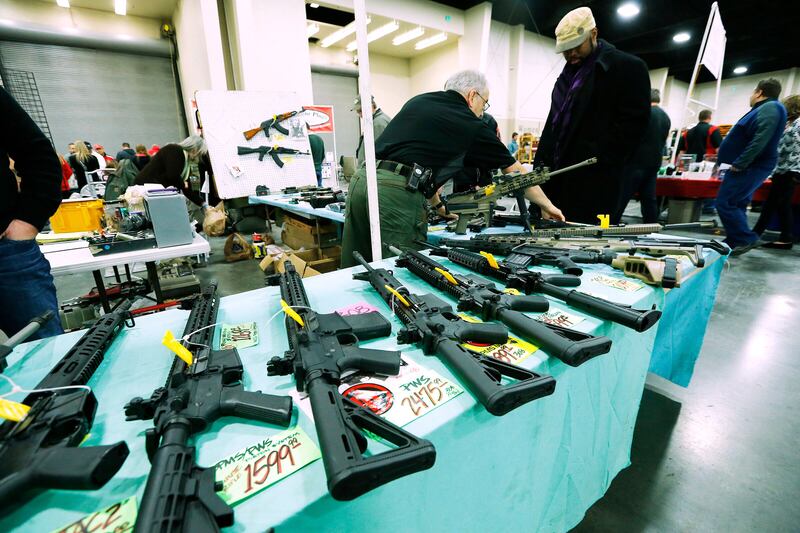A recent spate of mass shootings, including one in Southern California on Wednesday, have again ignited debate over reforming the nation’s gun laws.
Even before the unrelated killing sprees in Atlanta and in Boulder, Colorado, within a week of each other left 18 people dead in March, the Democrat-controlled House passed two gun safety bills, including one that would require background checks on all firearms sales and transfers.
Most Republicans, including all four of Utah’s congressmen, opposed those bills, which don’t appear to be going anywhere in the Senate where they would need 60 votes to pass.
But Utahns — regardless of political party or ideology — apparently want politicians to take some action.
A new Deseret News/Hinckley Institute of Politics poll shows only 11% of registered voters in the state don’t support any gun control measures. Interestingly, the poll shows a higher percentage of Democrats than Republicans don’t favor any gun control measures, 15% to 9%.

The survey found 65% of Utah voters favor universal background checks, which would require almost all firearms transactions to go through the National Instant Criminal Background Check System.
Current law calls for background checks only for those buying guns from a federally licensed dealer. But a significant amount of guns are purchased through private, unlicensed sales.
Among Democrats, 86% favored universal background checks compared to 47% of Republicans.
“I think the support for background checks is the reason so few say they oppose all restrictions,” said pollster Scott Rasmussen. And because the question was framed in reference to the recent shootings, people might be reluctant to say do nothing, he added.
Rasmussen surveyed 1,000 Utah registered voters March 26-31. The poll has a margin of error of plus or minus 3.1 percentage points.
Support for other measures, however, was markedly lower.
The poll found 34% favor banning assault-style weapons, while 29% support strict permitting processes for carrying a concealed weapon. Liberals, conservatives and moderates were within a few percentage points of each other on those measures, meaning there was about the same level of support among the three groups.
Rasmussen noted that support for restrictions, including background checks, is lower in Utah than nationally.
President Joe Biden called on Congress to pass a ban on assault weapons and high-capacity magazines after the Boulder shooting.

One of the House bills, HR8, would close a loophole in gun laws by expanding background checks to those purchasing firearms over the internet, at gun shows and through certain private transactions. Eight Republicans joined the Democrats in passing the bill.
The second bill, HR1446, would give authorities 10 business days — up from three — for federal background checks to be completed before a gun sale can be licensed. Only two Republicans supported the measure.
Rep. Chris Stewart, R-Utah, said the bills place unconstitutional restrictions on gun rights.
“There’s just no question that they go too far,” he said this week during a telephonic town hall. “I have supported some of this legislation in the past, but anything that strips away our fundamental right to protect and honor the Second Amendment, I will never support.”
Democrat-led efforts to pass tougher gun laws have repeatedly failed since the mass shooting at Sandy Hook Elementary School in Connecticut in 2012.
Neither Sen. Mike Lee, R-Utah, nor Sen. Mitt Romney, R-Utah, favor either of the two recent House bills.
“While Sen. Lee supports efforts to prevent future shootings, he has concerns that gun control measures — like universal background checks and banning certain types of firearms— will significantly restrict the rights of law-abiding Americans while doing little or nothing to deter violent crime,” according to a Lee spokesman Thursday.
Romney spokeswoman Arielle Mueller said Thursday that the senator committed during his election campaign to be open to updating the current background check system but that he would not vote for new federal gun legislation.
“He believes that it’s not appropriate for the federal government to tell states what to do with their gun laws, and that it should be left up to state legislatures to decide,” she said.
Utah lawmakers this year dropped the state’s requirement for people over the age of 21 to obtain a permit to legally carry a concealed firearm. Gun owners already may openly carry a firearm under state law without a license.
Republican Gov. Spencer Cox promptly signed the bill, making Utah the 17th state to pass a so-called “constitutional carry” law. It takes effect May 5.
As politicians debate gun rights, the U.S. Marshals Office in Salt Lake City said its violent fugitive apprehension strike team, made up of 26 state and local police agencies, has found more guns on the people it arrests.
“The increase in the number of fugitives with firearms is alarming,” said Matthew Harris, who heads the U.S. Marshals Office in Utah.
Of the 125 violent offenders the strike team has arrested this year, 37% were wanted for firearms violations and 34% have gang affiliations. Harris said the criminals often steal the guns from homes or use a “straw” buyer to purchase the weapon.


 alt=Dennis Romboy
alt=Dennis Romboy